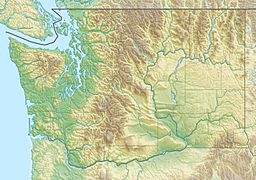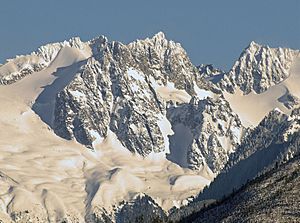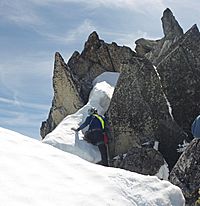Dorado Needle facts for kids
Quick facts for kids Dorado Needle |
|
|---|---|
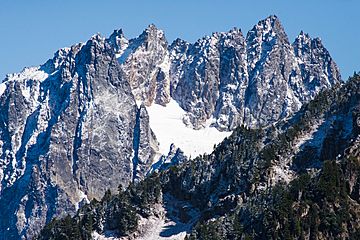
Dorado Needle (right) from Hidden Lake Peaks (Early Morning Spire and Marble Needle to left)
|
|
| Highest point | |
| Elevation | 8,440+ ft (2,570+ m) |
| Prominence | 800 ft (240 m) |
| Parent peak | Eldorado Peak 8,868 ft (2703 m) |
| Geography | |
| Location | North Cascades National Park Skagit County, Washington |
| Parent range | North Cascades Cascade Range |
| Topo map | USGS Eldorado Peak |
| Geology | |
| Age of rock | Cretaceous |
| Type of rock | Orthogneiss |
| Climbing | |
| First ascent | July 1940 by Lloyd Anderson, Karl Boyer, Tom Gorton, |
| Easiest route | Climbing YDS 5.5 |
Dorado Needle is a tall mountain in North Cascades National Park. It stands at 8,440+ ft (2,570+ m) high. You can find it in Skagit County, Washington state.
This peak is about 0.73 miles north of Eldorado Peak. It is also 1.33 miles southeast of Perdition Peak. You can often see Dorado Needle from the North Cascades Highway. There is a special viewing spot along the Skagit River.
The first people to climb Dorado Needle reached its top in July 1940. They were Lloyd Anderson, Karl Boyer, and Tom Gorton. They used the Northwest Ridge route. Water from the mountain, including melted glacier ice, flows into the Skagit River.
What is the Climate Like on Dorado Needle?
Dorado Needle is in a wet climate zone near the ocean. This area is called the marine west coast climate. Most weather systems come from the Pacific Ocean. They travel northeast towards the Cascade Mountains.
When these weather systems reach the North Cascades, the tall mountains force the air upward. This causes the air to cool and drop its moisture. This means lots of rain or snow falls on the Cascades. This process is called Orographic lift.
Because of this, the western side of the North Cascades gets a lot of rain. It gets especially heavy snowfall during the winter months. Winters are usually cloudy. However, during summer, high pressure systems over the Pacific Ocean bring clear skies.
The snow here tends to be wet and heavy. This can create a high risk of avalanches.
How Did Dorado Needle Form?
The North Cascades area has very rugged land. You can see sharp peaks, spires, and deep valleys carved by glaciers. These amazing shapes were created by geological events over millions of years. These events also caused big changes in height across the Cascade Range.
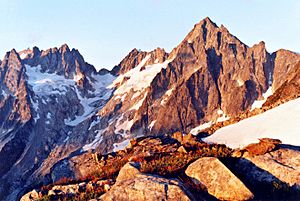
The Cascade Mountains began to form millions of years ago. This was during the late Eocene Epoch. At that time, the North American Plate was slowly moving over the Pacific Plate. This movement caused many volcanoes to erupt.
Also, small pieces of land called terranes joined together. These pieces of both ocean and land crust helped form the North Cascades about 50 million years ago.
During the Pleistocene period, which was over two million years ago, glaciers grew and shrank many times. These moving glaciers carved and shaped the landscape. A small piece of a glacier is still on the south side of Dorado Needle. The northern side has the large McAllister Glacier.
The river valleys in this area have a U-shape. This shape is a clear sign that glaciers once moved through them. The mountains became tall due to land pushing upward (uplift). Cracks in the earth's crust (faulting) also played a role. These processes, along with glaciation, created the tall peaks and deep valleys we see today.
Climbing Routes on Dorado Needle
Dorado Needle is a popular spot for climbers. Here are some of the routes:
 | James Van Der Zee |
 | Alma Thomas |
 | Ellis Wilson |
 | Margaret Taylor-Burroughs |


